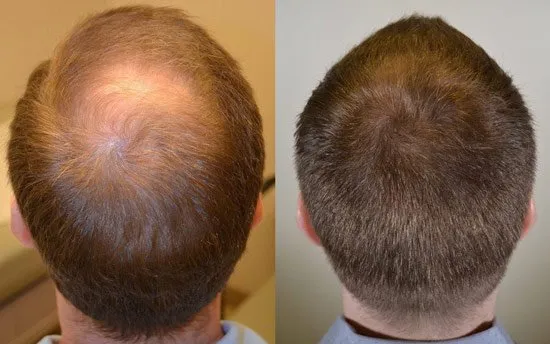
Hair loss is a common problem among men. Hence, it’s no surprise that there are so many products and hair loss treatments for males.
Finasteride, which is available under the trade names Proscar and Propecia, is a best medicine for hair fall in men. It is a medication used in benign prostatic hyperplasia and hair loss treatment for men.
Propecia is a brand name for the generic form of Finasteride, a prescription-only oral pill given1mg daily or alternate days, to decrease hair loss in males. It is a prescription medication that won the FDA’s approval in 1997 to treat male pattern hair loss. Despite being a proven successful therapy, some patients cannot overcome some of the drug’s negative effects, such as diminished libido, erectile dysfunction, and decreased amount of sperm.
It should be noted that Finasteride prevents male pattern hair loss, but does not regenerate hair that has been irreversibly gone; rather, it halts hair loss in its tracks.
Propecia inhibits the conversion of testosterone to the androgen Dihydrotestosterone by blocking the enzyme 5-alpha reductase, which is involved in the conversion of testosterone to dihydrotestosterone (DHT). Testosterone is a hormone found in both men and women, however, males have more testosterone in their systems. In adults, around 5 to 7% of testosterone is turned to DHT. However, testosterone is responsible for hair development in the body.
DHT is a derivative of the male hormone testosterone that signals to the hair follicle to undergo shrinkage. Over time, this results in a finer, thinner, lighter hair shaft that gradually shrinks until the follicle no longer generates a hair shaft.
Propecia and all Finasteride pills require a prescription, which means they cannot be purchased over the counter like minoxidil treatments like Rogaine. Unlike Finasteride, Rogaine is a topical therapy that dilates blood vessels in the scalp to synchronize the hair into an active growth phase. Finasteride can also be made as a topical solution for people who cannot or will not take it orally.
Can women take Finasteride?
Women should not use Propecia because it is only FDA-approved for men. It is not advised for women of reproductive age because of the risk of fetal birth abnormalities. It is not advised for any woman of reproductive age, whether or not she intends to become pregnant.
Because the medicine causes prenatal deformities or abnormalities and can cause fetal loss, it is strongly advised that any woman of reproductive age avoid it. But, women who have had hair loss after menopause have found success with Finasteride.
Conclusion
As it does an excellent job of keeping and even thickening existing hair, Finasteride is a best medicine for hair fall in men. It preserves the native hair and significantly slows the thinning and falling out process. Women who can give birth to a child should not take Finasteride.
It can be a key part of hair loss treatment for men, but anyone interested in using it should first check with their doctor before requesting a prescription for Finasteride.